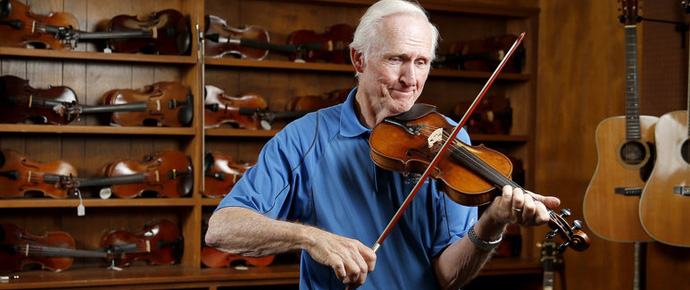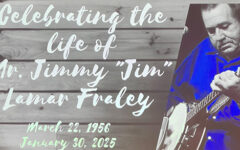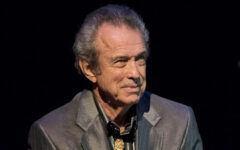
Byron was one lovely, friendly, and articulate guy. He was among the most tasteful, talented, and solid fiddle players ever.
It would be hard to think of another bluegrass musician who performed and recorded in more diverse situations. The list is mind boggling. A few examples: The Rolling Stones’ Country Honk, the Star Trek movie, The Dillards, The Flying Burrito Brothers, Bob Dylan, Elton John, Rod Stewart, and bands he founded like Country Gazette, Berline, Crary & Hickman or BCH (later called California), and Sundance.
He played in numerous movies, notably Blaze with Paul Newman, Basic Instinct with Michael Douglas, and many more. Byron even taught Arnold Schwarzenegger how to look like he could play the fiddle while portraying an old-time musician in the movie, Stay Hungry, with Jeff Bridges and Sally Fields.
“How was Arnold as a student?” I asked him once. “Oh, he was real good,” said Byron. “I mean, he could [have] actually learned to play Boil ‘Em Cabbage Down, if he kept at it. He could do the shuffle.” When it came time to shoot the scene, Byron explained, “I just took all the rosin off [his] bow. He could play all he wanted, but no sound came out. I did all the fiddling, but it looked like he did it.” (Not unlike Dan Tyminski’s feat of becoming the singing voice of George Clooney many years later in O Brother, Where Art Thou)
For more than five decades now bluegrass players have enjoyed one of Byron’s earliest musical efforts. It’s from his lone recording session with Bill Monroe during his brief stint as a member of the Blue Grass Boys in 1967. If you play bluegrass at any level, you’re likely to be familiar with the jam session favorite, Gold Rush.
“Did you actually write Gold Rush?” I asked. “Well, I helped Bill with it,” Byron replied. “He had the initial idea, and we sat on the bus and worked [the rest of it] up. He’s very particular [about] the melody.” What Byron wrote is the chorus or second part. Byron was quietly proud—in his typical low-key way—of the fact that he had a live performance tape where Monroe said, “Now that part he puts in there is real pretty I think.”
“There’s actually a third part at the end …where we go out of the tune,” Byron continued… instead of ending it the regular way. So that’s definitely my part [too].”
Music was not the only area in which Byron excelled. Upon leaving Monroe, he was stationed at Fort Polk, Louisiana as a draftee. He endeared himself to the base’s top brass when he and a team of soldiers Byron helped put together won the Fourth Army Track Meet—a major feather in the cap for the fort. Byron himself won both the shot put and the javelin throw. He felt this episode kept him from being shipped to a combat unit in Vietnam.
How many in the bluegrass community could match his musical achievements plus his athletic prowess while maintaining the affable personality that touched so many of us from the stage and in person?
Thanks, Byron, for everything!







